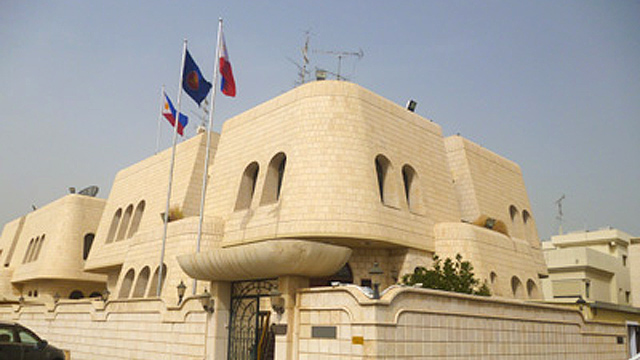SUMMARY
This is AI generated summarization, which may have errors. For context, always refer to the full article.

MANILA, Philippines – A Philippine embassy official has been implicated in the trafficking of migrant workers in Kuwait.
In an initial report by the Kuwait Anti-Trafficking Task Force released Friday, January 17, trafficking and other related charges were recommended against Philippine consul Ibrahim Daligdig Tanandato, two embassy-hired contractuals, two embassy-hired lawyers, and 3 recruiters.
Tanandato is the Assistant to (the) National Unit Head in the Philippine consular office in Kuwait.
The Task Force – a Philippine panel created in September 2013 – endorsed the 7 suspects to the Department of Justice (DOJ) for preliminary investigation in pursuit of the cases it outlined.
Criminal cases against 5 other suspects for syndicated illegal recruitment were already forwarded to the city prosecutor in Manila. Three of them – Amor Decepeda, Nora Pilpa Sevillano, and Regina Padiernos – were employees of recruitment agency Ascend International Services.
At least 25 other individuals, including embassy officials, and 12 recruitment agencies still need to be investigated.
Complaints
The complainants were allegedly hired by an embassy official to work as domestic helpers, even without any proper documentation as migrant workers. They were given a monthly salary of P8,000.
The same official was also accused of deceiving one of the helpers into believing that her back pay had not yet been released by her previous employer.
Sexual abuse, unpaid back pay, and a 20-hour work per day with no or limited food were just some of the conditions that complainants endured in the hands of their employers, based on sworn statements.
Embassy-hired lawyers were implicated for failure to provide legal assistance in the prosecution of offenders in the complaints and for demanding for attorney’s fees from the helpers.
An official and embassy-hired lawyers were also accused of insisting that a helper settle her case in exchange for money.
Limited rights
As it is, migrant workers in Kuwait have limited rights.
A sponsorship system is in place, wherein a migrant worker’s visa status is dependent on his/her employer.
The system of having employer-sponsors as a prerequisite for a work permit enables employers to exploit migrant workers, often subjected to unjust pay and harsh working conditions. It has been a subject of debate in the Kuwaiti parliamentary.
According to a 2010 Human Rights Watch report, Kuwait has the highest ratio of domestic helpers to citizens in the Middle East.
About a third of Kuwait’s labor force are migrant domestic workers, the report added. – Rappler.com
Add a comment
How does this make you feel?
There are no comments yet. Add your comment to start the conversation.